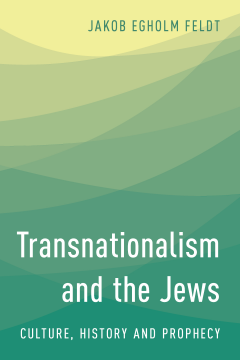
Additional Information
Book Details
Abstract
The concept of transnationalism has been widely used for many years to describe mobility and cross-border relations in the modern, globalized world. Most uses of the concept of transnationalism neglect its historical trajectory and largely ignore the networks that constructed its meaning and normativity.
Transnationalism and the Jews directly relates ideas about transnationalism and cultural pluralism to Jewish historical experience. It shows how the Jews and ‘Jewishness’ has been a problematic issue for cultural thought since the Enlightenment, and how this problem produced the alternative ideas of culture and identity that are widely accepted today.
It argues that Jewish experience and ‘Jewishness’ helped produced the modern concept of transnationalism and cultural pluralism.
Jakob Egholm Feldt is Associate Professor of Transnational and Global History at Roskilde University, Denmark. His research deals with the construction and development of ideas and concepts in the Humanities and modern intellectual culture. He is particularly interested in the construction and development of ideas, concepts and methods within modern Jewish history, anti-Semitism, Zionism, European-Middle Eastern cultural relations and cultural and historical philosophy.
Over the past 10 years, he has published widely on cultural theory, Orientalism, and Jewish history including The Israeli Memory Struggle. History and Identity in the Age of Globalization (2007) and Lived Space (with Kirstine Sinclair, 2011) as well as edited volumes and articles in both English and Danish.
Jakob Egholm Feldt’s book is a masterful exploration of the ‘metaphorical landscape of Jewishness’. He tracks how the early twentieth-century concept of transnationalism has been lost and refound and he convincingly demonstrates its urgent implications for our own times. At the heart of his study is a reflection on how the particular history of Jews has become a universal experience.
Miriam Leonard, Professor of Greek Literature and its Reception, University College London
Meticulously researched and brilliantly argued, this timely and pertinent book restores historical depth and conceptual clarity to ‘transnationalism’. Building on pragmatic philosophy, it demonstrates how the Jewish experience emerged in the early twentieth century as an exemplar for pervasive phenomena affecting our own time. To some extent, this is making old pots shine again. But Jakob Egholm Feldt has given this old pot spectacular lustre – and he has ladled out a tasty and nourishing broth.
Dr. Axel Stähler, Reader in Comparative Literature, University of Kent
